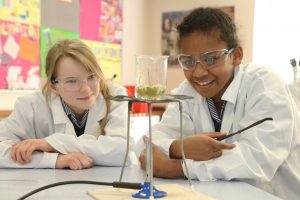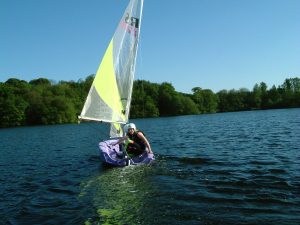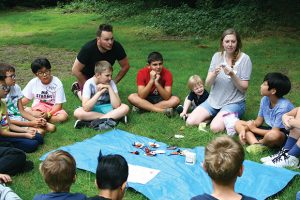 Tony Binns, founder of Our World English Schools, explains how holiday courses open up a whole new world of learning
Tony Binns, founder of Our World English Schools, explains how holiday courses open up a whole new world of learning
On a programme that is likely to last for just a few weeks, with children of all levels of English and from all corners of the globe, how can the learning experience be anything other than superficial? And yet the evidence, from feedback forms, from the high return rate of students and from the buzz that you cannot fail to notice when you walk around any good summer school campus, suggests that a junior vacation programme really can be a life-changing educational experience.
The moment a student sets off to summer school, the learning begins, with a journey that in some cases might involve an eight-year-old travelling halfway round the globe. On arrival, there may be the adjustment to time zones, to the climate, the food and the local customs – not to mention the fact that they may find themselves immersed in a new and unfamiliar language. They really do enter another world. This rich environment for learning brings to mind Albert Einstein’s assertion that ‘the only source of knowledge is experience’ – and what a great experience it is.
What kind of courses are available?
A large number of UK boarding schools offer vacation courses, either directly or through an outside organisation, in March/April or July/August, when the main school is in its holiday period. Some courses are designed solely for international students, while others also cater for boys and girls from the UK. The majority of courses combine English language learning and/or other academic study with sporting and social activities, plus excursions – so they are referred to as ‘English Plus’. There are many programmes to choose from, some including options or specialisation in subjects such as music, dance, drama, golf, tennis or soccer, so it is worth looking around at what is available.
Courses are generally residential, and the standard of accommodation offered by UK boarding schools is high, many now offering single and twin rooms with en-suite bathrooms. Another possibility for international students is staying with a host family, which provides a fuller immersion in British life and a different perspective (most suited to students aged 16 and over). There should be a good nationality mix – over 20 different nationalities is typical on good courses – and ideally students arriving in groups will be mixed in with others for classes and activities so that English remains the common language. The recommended class size is between 12 and 16 students, and although courses range in duration from two to six weeks, the most popular stay is for three weeks.
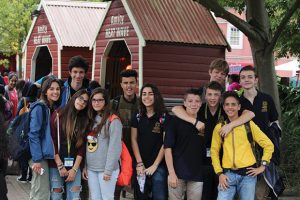 What are the benefits of short holiday courses?
What are the benefits of short holiday courses?
Vacation courses offer genuine communicative experiences for children as they negotiate day-to-day tasks with their peers and staff members. They are exposed to a variety of accents and styles, which improves their listening skills and awareness of English pronunciation. Not only do the students see how useful their English can be in a context beyond the classroom, but they have meaningful practice in a way that is impossible to experience at home as well as gaining valuable insights into English customs.
However, from the students’ perspective, perhaps the most important thing they take away from the experience is the friendships they make. As the best-connected, most technologically aware generation ever, these children are always interested in staying in contact and have the tools to do so. English is increasingly the language of the internet and social networking, and a vacation course provides the seed from which real friendships can grow, giving these children the desire and confidence to use their English socially – often for many years after the course is over.
What marks out excellent students of English from average ones is the fact that they have incorporated English into their lives, and short courses provide a starting point for a journey that lasts a lifetime. In addition to the language learning and friendships, there is also the insight into British culture and history gained through excursions to destinations such as London, Oxford, York or Edinburgh.
What do short holiday courses consist of?
Most courses offer a mixture of elements to give variety and interest: classes, activities, sports, excursions and social events. When calculating the amount of classroom-based learning you need to make sure how long each lesson lasts – what matters is the number of hours of teaching time rather than the number of lessons. It is also important to check the number of students in each class, with 12 to 16 being an ideal range. Parents naturally want to maximise their child’s exposure to English learning, but it is worth noting that an ‘intensive’ course that consists of only classroom English may not provide the variety of stimulation which suits the needs of the young learner. Half a day of English and the remaining half split between sport and activities such as computing and the performing arts gives just the right balance. Course content and teaching styles vary according to the age of the students, which ranges from around 8 to 17 years.
Even courses that emphasise the academic element do respect the fact that this is holiday time as well as being an educational programme. Those courses offering on-campus accommodation usually organise evening and weekend activities for students, frequently including sightseeing visits to places of interest. Talent shows, discos, fancy dress parties and ‘mini-Olympics’ are, for many, a highlight of the course. Most institutions offer an impressive range of sporting and other facilities; typically, these will include an indoor swimming pool, tennis and basketball courts, football fields, squash and badminton courts. Many courses can make arrangements for students to have access to other, more specialised, activities such as horse-riding, rock-climbing, canoeing and windsurfing. Recreational facilities in addition to sports may include common rooms equipped with table tennis, pool, table football, television and videos. The fun activities often provide the students with particularly vivid memories.
Good courses will generally test students on arrival and test them again at the end of the course to measure progress. A written academic report is usually available at the end of the course, and this can be useful for teachers in the student’s home country. They can see the subjects and topics covered, and how well the student performed. There may also be an indication of areas of weakness that need further work as well.
Accreditation
One way to ensure the high quality of a summer school is to look for the Accreditation UK logo. Accreditation UK is a British Council scheme that ensures that a school is operating within the law and delivering satisfactory standards on inspection in the key areas of teaching, resources, welfare, premises and management. All organisations offering English language tuition to visa national students (students who require a visa to enter the UK) have had to be accredited by one of four bodies approved by UK Visas and Immigration – Accreditation UK is one of these bodies. The English UK website offers a course search facility, which lists all British Council-accredited junior courses in the UK.
A taste of British boarding
In addition to the learning of life skills, spring and summer courses offer a perfect chance to sample life in a boarding school. The positive experience of a well-run course will give students a welcoming taste of boarding school life. Courses offering an element of English, or other academic subjects, will also help to prepare the student for the intellectual and linguistic challenge of their new environment. Students can choose one of a number of courses designed specifically as preparation for boarding school life, or choose an international study centre summer course, which can then be extended into longer-term preparation for entry to a UK boarding school.
Coming back for more…
The extremely high rate of individuals returning to the same courses year after year is the best testament spring and summer schools could wish for. No matter how short a course is, the benefits and memories that students take from it last long into the future.
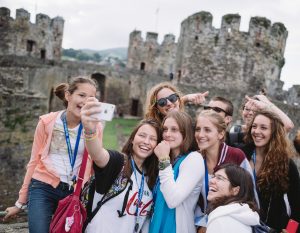 Frequently asked questions
Frequently asked questions
What are the typical arrangements on arrival?
Upon arrival, you will normally be met by an institution representative at the Arrivals point at the airport. The representative will be holding a school sign, and will usually be wearing the appropriate uniform. Children under 12 years old are classed as ‘Unaccompanied Minors’ (UM), and will be introduced to the school representative by a member of the airline staff. Once students have met the representative from the school, they will be assisted with their luggage and taken to the transport (usually a car, coach or minibus), which will take them to their chosen institution.
If my English isn’t so good, will people be able to understand me?
Don’t worry about your level of English. All teachers at your chosen school will be professionals in their field and are there to help you improve your English. Most teachers will be native English speakers with a lot of experience in dealing with international students. You will make many friends of different nationalities who all have the same goal in mind – to improve and practise their English.
Who can help if I become unwell or upset during my stay?
All residential spring and summer schools are required by law to employ a qualified first-aider. This person, who should be available at the school 24 hours a day, will be able to help students who feel unwell or have suffered a minor injury. Many schools also have a registered nurse in residence. The nurse can help with more serious injuries and arrange hospital and doctor’s appointments. The nurse is also a good person to speak to if you feel anxious about anything – for example, missing your family and friends, or any issues at the school during your stay.
What will the accommodation be like at the school?
Most schools’ accommodation types range from single and twin rooms with their own (en-suite) bathroom, to more traditional dormitories with up to eight beds in the same room. When you make your reservation, you will have the opportunity to discuss the accommodation possibilities and select the one that is best for you.
What is included in the cost of my course?
Many programmes are ‘all-inclusive’, with everything from tuition, accommodation and food to social activities and excursions included in the cost of your stay. You are also likely to be provided with an English course book or a syllabus, around which your lessons are based. Many schools also include the entrance fees to excursion destinations in the cost of the stay. If you are enrolled on an all-inclusive course, the only extra money you should need is some pocket money – about £70 per week, for example. When comparing the cost of courses check what is included – if airport transfers are charged as extra this can add considerably to the overall course fee.
What should I bring with me to the school?
When you make a reservation, your school may provide you with a list of things to bring. Mostly this is common sense, but you should check, for example, whether towels are provided. When packing, remember that during the summer months of July and August, temperatures can reach over 30°C. Equally, you should also bring some clothing suitable for wet or cold weather. You should also bring sports kit for most courses, including swimming costume. A suitable plug adaptor may be needed for your phone or laptop.
